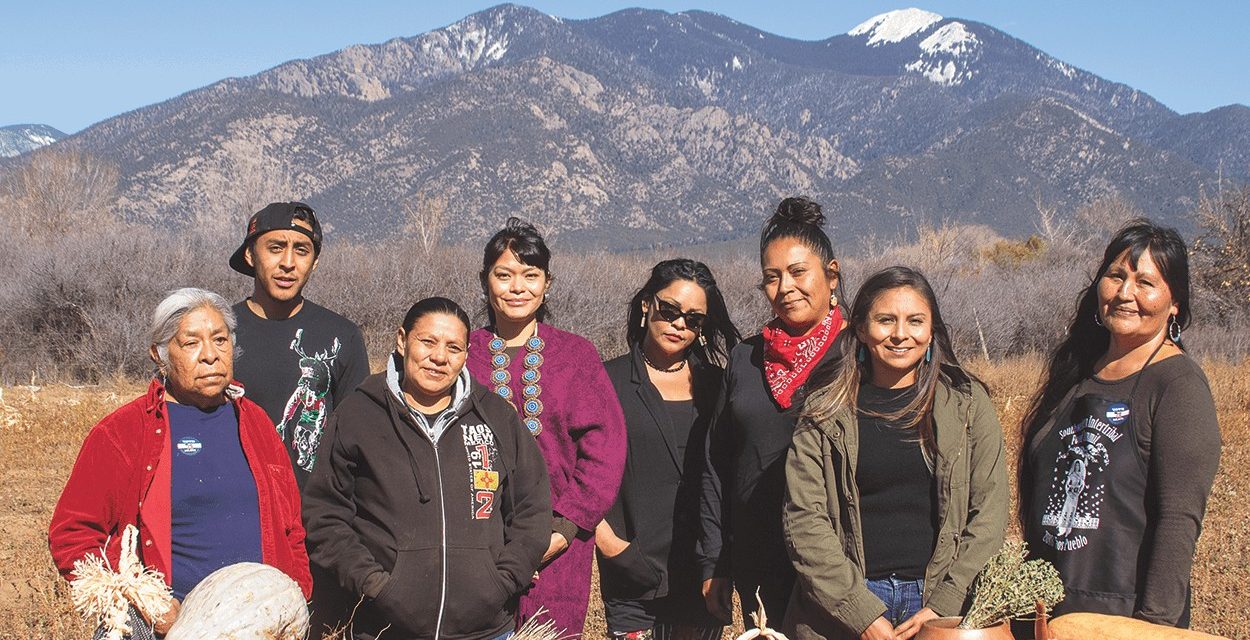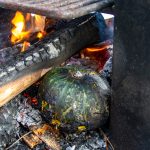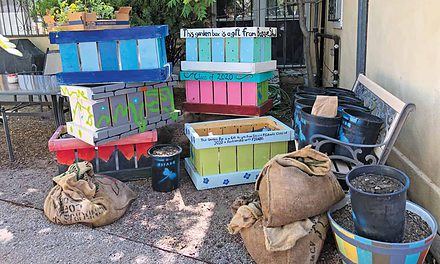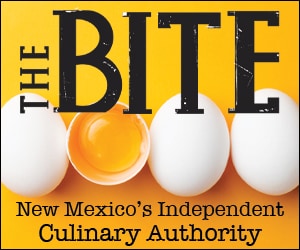Red Willow Farm Rooted in Tradition, Focused on the Future
By RoseMary Diaz · Photos by Stephanie Cameron

From left to right: Henrietta Gomez, board member/elder; Randon Tafoya, youth education coordinator; Janell Lujan,
production manager; Krystle McCabe, market vendor/volunteer; Karin Martinez, farm chef/vendor; Sheryl Romero,
community outreach coordinator; Shundine Suazo, market vendor; and Jeralyn Lucero, farm vendor/consultant.
Planted under the south-facing gaze of Taos Mountain, where antelope abound and stars reflect in the cold, clear currents of the Rio Pueblo and Rio Lucero, Red Willow Farm is growing food and leaders. Since its founding in 2002, its crops have vined bountifully from carefully tended rows, nourished by the rich soil of the mountain’s base, and by a commitment among the farm’s collective of food visionaries to keep alive time-honored techniques for growing and harvesting ancestral foods of the Tiwa people. A shared venture between the nonprofit Red Willow Farm and Taos Pueblo, the farm produces food for distribution within the Pueblo community and for commercial sale at the Taos Pueblo Farmers Market, as well as for use in the tribe’s religious observations and ceremonies. Though the farm is based on ancient methods, it maintains uninterrupted, year-round production with modern technologies when traditional ones are disrupted. As host to a hands-on, farm-to-school partnership with Taos Pueblo Community Health Services and Taos Pueblo Day School and Head Start, the farm’s young interns are heartened by testing out new techniques. “We are an educational farm; there are no wrong answers,” explains Sheryl Romero, Red Willow’s director of marketing and community relations. “Experimentation is encouraged.”
“Agriculture is a huge part of our culture that we cannot lose,” says Randon Tafoya, Red Willow’s youth coordinator. At Red Willow Farm, “We do what we can for the preservation of healthy, wholesome food; and, most of all, for our people and our culture. It starts with empowering our youth, getting them into something they would have never thought twice about doing in today’s ever-expanding world.”
We recently caught up with Romero, Tafoya, and other members of Red Willow Farm, including Ryan Rose, farm director; Janell Lujan, production manager; Bill Bockbrader, farm consultant; and Christina Castro, board director, who collectively shared the following thoughts.

How is Red Willow Farm incorporating ancient and modern sustainable farming practices into its operation?
Red Willow Farm uses techniques from our ancestral past to teach the skills that come with farming. We stress the importance of integrity, respect, accountability, ownership, and pride in culture; as well as the importance of embracing modern technology to achieve self-sustainability.
For example, our outdoor field consists of traditional and commercial growing methods. On the traditional side, culturally grounded approaches ensure the crops maintain a Native-grown integrity. Randon and his crew, which includes youth intern farmers Brandon Lujan and Paul Montoya [students at Santa Fe Indian School and Taos Academy, respectively], revitalized the acequia system that enables traditional methods of watering this particular field. As with our ancestors, rain is relied upon heavily. The catch system allows us to maintain water quality, and watering is done by hand and bucket only. This upholds the integrity of the operation by safeguarding the purity of all the elements coming into contact with plants. Only tribal members are allowed to work in this field. Our Tiwa language and identity are emphasized heavily here, and by controlling the authenticity of the methods used, we can ensure that the food grown can be used in the religious community.
The commercial side, which is strictly for market, is plowed, drip-lined, and experimented on all the time. [Some of that experimentation takes place on a quarter-acre plot dedicated to the Waru Waru Pilot Project, which utilizes ancient Andean farming and aquaponics techniques.]
Indigenous wild plants also grow on the farm. These are used in cultural and religious activities, and the seeds are harvested. After the spring thaw, our youth [disperse] the seeds throughout the Pueblo community. We came to this idea after an abundant crop this year, and after the massive decline of crops within the reservation. This teaches our youth about community, a pillar to our way of life, and about the importance of personal responsibility and action within [one’s] homeland.
Why is agriculture so important to Taos cultural heritage?
Agriculture is important to all people. No matter who you are, you have a culturally significant food that your DNA remembers. When you eat it, you feel and see the difference, and understand how food speaks to the soul, helps us reclaim our health and our identity. In the past, the [Tiwa] people relied on farming, foraging, and preserving, which provided an abundance of healthy, traditional foods. Now, it’s harder to maintain those practices. But, with farming, we can supply our community with fresh, wholesome produce.
Through agriculture, traditional practices are handed down to the younger generation, ensuring the survival of indigenous Pueblo foods. So, not only is it important for the future, it’s a great reminder of where we’ve been. Community and youth are the backbone of the farm. Without both we will never achieve the dreams we strive for: education, leadership, food sovereignty, and food sustainability.
What is the connection between the farm and the lessons of the Pueblo ancestors, especially for the younger generation?
The goal of our farmers is to revitalize [ancient agricultural practices] through our youth. It reminds them who they are, where they came from, and what our people ate to get here. Harnessing that knowledge will help them preserve the agriculture we have now.
By problem solving on a daily basis and using the internet in unison with practices taught to them by their parents and grandparents, and following their own intuition, Randon and his team have learned to balance old with new. Recently, they were advised against the timing of planting outside. But, in the farm’s tradition of curiosity, they went ahead and planted. Using the farm’s own compost, worm castings, and well water, they not only proved [the doubters] wrong, but were extremely happy with a bountiful crop.
Most of the youth come to the farm already farmers, so usually they’re sharing more than learning. Once exposed to the significance of community and food sovereignty, they understand the importance of their role in keeping traditional foods [on the table]. Keeping the youth connected to the elders is important. When they become leaders, maybe they will remember our humble teachings: respect through trust; honesty through accountability; integrity through friendship; love through family.
redwillowfarm.org
Edible celebrates New Mexico's food culture, season by season. We believe that knowing where our food comes from is a powerful thing. With our high-quality, aesthetically pleasing and informative publication, we inspire readers to support and celebrate the growers, producers, chefs, beverage and food artisans, and other food professionals in our community.












